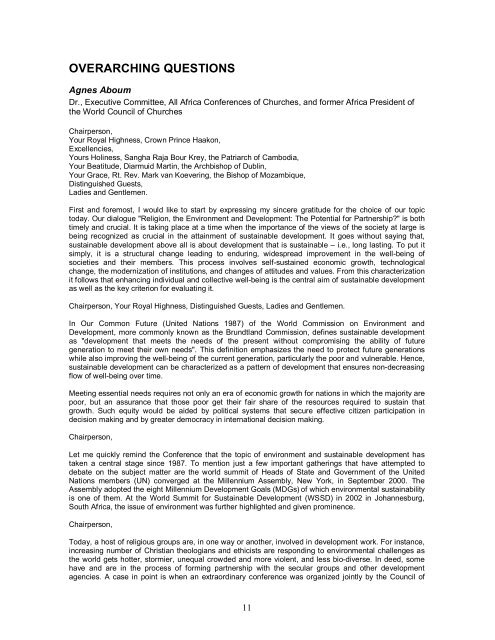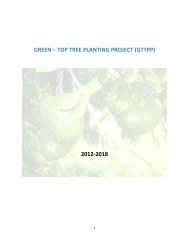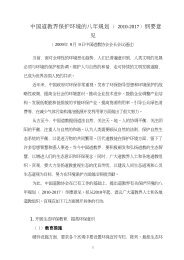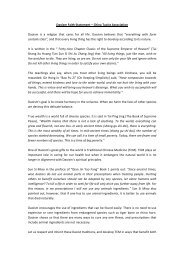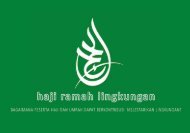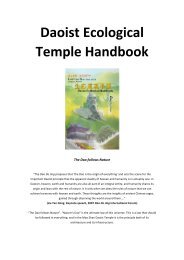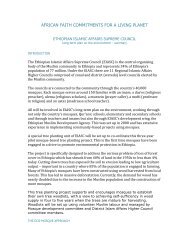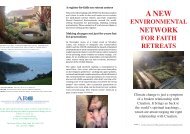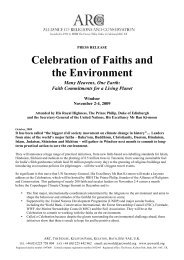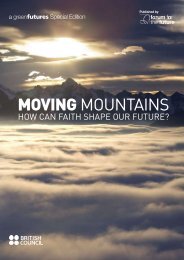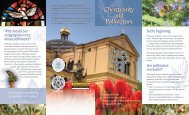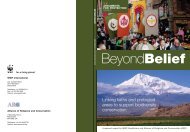summary paper - Alliance of Religions and Conservation
summary paper - Alliance of Religions and Conservation
summary paper - Alliance of Religions and Conservation
Create successful ePaper yourself
Turn your PDF publications into a flip-book with our unique Google optimized e-Paper software.
OVERARCHING QUESTIONS<br />
Agnes Aboum<br />
Dr., Executive Committee, All Africa Conferences <strong>of</strong> Churches, <strong>and</strong> former Africa President <strong>of</strong><br />
the World Council <strong>of</strong> Churches<br />
Chairperson,<br />
Your Royal Highness, Crown Prince Haakon,<br />
Excellencies,<br />
Yours Holiness, Sangha Raja Bour Krey, the Patriarch <strong>of</strong> Cambodia,<br />
Your Beatitude, Diarmuid Martin, the Archbishop <strong>of</strong> Dublin,<br />
Your Grace, Rt. Rev. Mark van Koevering, the Bishop <strong>of</strong> Mozambique,<br />
Distinguished Guests,<br />
Ladies <strong>and</strong> Gentlemen.<br />
First <strong>and</strong> foremost, I would like to start by expressing my sincere gratitude for the choice <strong>of</strong> our topic<br />
today. Our dialogue "Religion, the Environment <strong>and</strong> Development: The Potential for Partnership" is both<br />
timely <strong>and</strong> crucial. It is taking place at a time when the importance <strong>of</strong> the views <strong>of</strong> the society at large is<br />
being recognized as crucial in the attainment <strong>of</strong> sustainable development. It goes without saying that,<br />
sustainable development above all is about development that is sustainable – i.e., long lasting. To put it<br />
simply, it is a structural change leading to enduring, widespread improvement in the wellbeing <strong>of</strong><br />
societies <strong>and</strong> their members. This process involves selfsustained economic growth, technological<br />
change, the modernization <strong>of</strong> institutions, <strong>and</strong> changes <strong>of</strong> attitudes <strong>and</strong> values. From this characterization<br />
it follows that enhancing individual <strong>and</strong> collective wellbeing is the central aim <strong>of</strong> sustainable development<br />
as well as the key criterion for evaluating it.<br />
Chairperson, Your Royal Highness, Distinguished Guests, Ladies <strong>and</strong> Gentlemen.<br />
In Our Common Future (United Nations 1987) <strong>of</strong> the World Commission on Environment <strong>and</strong><br />
Development, more commonly known as the Brundtl<strong>and</strong> Commission, defines sustainable development<br />
as "development that meets the needs <strong>of</strong> the present without compromising the ability <strong>of</strong> future<br />
generation to meet their own needs". This definition emphasizes the need to protect future generations<br />
while also improving the wellbeing <strong>of</strong> the current generation, particularly the poor <strong>and</strong> vulnerable. Hence,<br />
sustainable development can be characterized as a pattern <strong>of</strong> development that ensures nondecreasing<br />
flow <strong>of</strong> wellbeing over time.<br />
Meeting essential needs requires not only an era <strong>of</strong> economic growth for nations in which the majority are<br />
poor, but an assurance that those poor get their fair share <strong>of</strong> the resources required to sustain that<br />
growth. Such equity would be aided by political systems that secure effective citizen participation in<br />
decision making <strong>and</strong> by greater democracy in international decision making.<br />
Chairperson,<br />
Let me quickly remind the Conference that the topic <strong>of</strong> environment <strong>and</strong> sustainable development has<br />
taken a central stage since 1987. To mention just a few important gatherings that have attempted to<br />
debate on the subject matter are the world summit <strong>of</strong> Heads <strong>of</strong> State <strong>and</strong> Government <strong>of</strong> the United<br />
Nations members (UN) converged at the Millennium Assembly, New York, in September 2000. The<br />
Assembly adopted the eight Millennium Development Goals (MDGs) <strong>of</strong> which environmental sustainability<br />
is one <strong>of</strong> them. At the World Summit for Sustainable Development (WSSD) in 2002 in Johannesburg,<br />
South Africa, the issue <strong>of</strong> environment was further highlighted <strong>and</strong> given prominence.<br />
Chairperson,<br />
Today, a host <strong>of</strong> religious groups are, in one way or another, involved in development work. For instance,<br />
increasing number <strong>of</strong> Christian theologians <strong>and</strong> ethicists are responding to environmental challenges as<br />
the world gets hotter, stormier, unequal crowded <strong>and</strong> more violent, <strong>and</strong> less biodiverse. In deed, some<br />
have <strong>and</strong> are in the process <strong>of</strong> forming partnership with the secular groups <strong>and</strong> other development<br />
agencies. A case in point is when an extraordinary conference was organized jointly by the Council <strong>of</strong><br />
11


